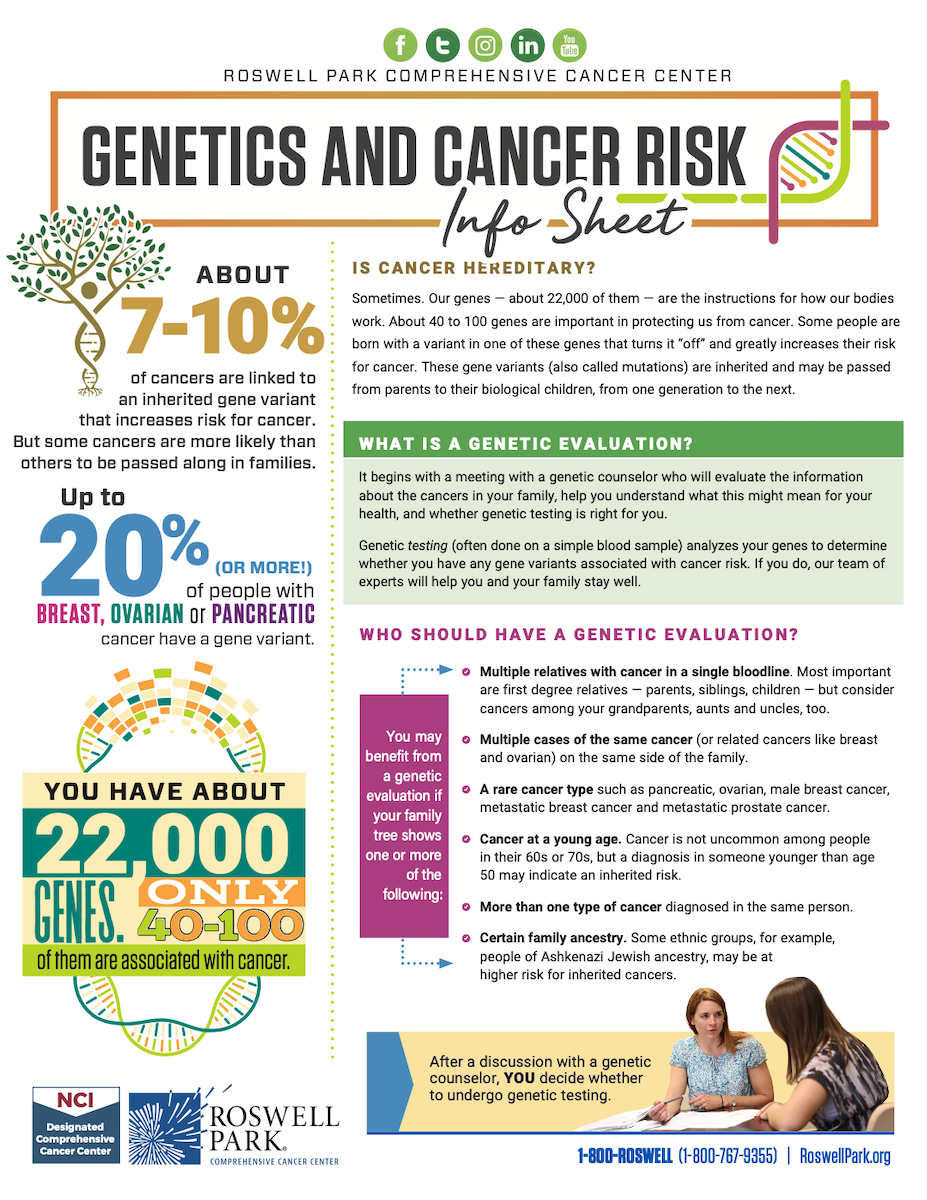A genetic evaluation and testing is important for two groups of people: those who have cancer and families with cancers.
For people who are already diagnosed with cancer — especially breast, ovarian, endometrial, pancreatic, prostate or colorectal — knowing whether the cancer was linked to a genetic variant may impact their current treatment. For people with cancer in their family — especially multiple cancers, rare cancers, or a cancer at a young age — a genetic evaluation and testing can determine whether (or not) you have an increased risk for developing cancer in your lifetime.
About 7 to 10% of cancers are associated with an inherited gene variant (sometimes called a gene change or mutation). If you inherit one of these variants, you will have a higher risk for developing cancer. While having an inherited risk does not mean that you will get cancer, our experts in genetic medicine can help you to understand this risk and take charge of your health.
Genetic testing for people with cancer
If you have been diagnosed with cancer, genetic testing can determine whether it was caused by a genetic variant, important information that may help guide your current cancer treatment and allow you opportunity to increase screening and surveillance for a related cancer. In addition, it can help determine whether other family members, such as your children, should consider genetic testing.
Your physician may recommend genetic testing if you have one of the following factors:
- Cancer of the breast, ovary, uterus (or endometrium), pancreas, prostate, colon or rectum
- A rare cancer type such as male breast cancer, medullary thyroid cancer, adrenocortical carcinoma, choroid plexus tumor, pheochromocytoma, paraganglioma or sarcoma
- You were diagnosed with a typical adult-onset cancer before age 50
- You have other people in your family with the same cancer
Many cancer patients with an inherited gene variant — up to 50% — do not have any warning signs such as a family history of cancer. But knowing this information may change the type of cancer treatment that you need to best fight your cancer.
Genetic testing for people with cancer in their family
Genetic testing can be very beneficial if you have one or more of the following among your family members:
- Two or more people with the same cancer, or cancers that are related, such as breast and ovarian, or colon and uterine.
- The same cancer in several generations on the same side of the family
- A cancer diagnosis before age of 50
- More than one type of cancer in the same person
- A rare cancer, such as male breast cancer, medullary thyroid cancer, paraganglioma, sarcoma, adrenocorticol carcinoma, pancreatic or ovarian cancer
- A cancer without exposure to a known risk factor
- Ashkenazi Jewish ancestry and a family history of breast, ovarian, prostate or pancreatic cancer
- Someone in your family has already had genetic testing and was told that they have a genetic predisposition to cancer
- Polyposis, a condition of having multiple polyps in the stomach or intestines
If you are concerned about your risk for cancer due to your personal or family cancer history, we recommend a genetic consultation. Some people without an extensive history may still be at risk and would benefit from a consultation.
Why learn about your genes?
Learning that you have a gene variant associated with cancer risk, or a hereditary cancer syndrome, might sound almost as difficult as receiving a cancer diagnosis. But having this information is powerful because you can take steps to reduce your risk for cancer, detect it very early, or prevent it. You DO have options, and these may include:
- Specific cancer surveillance, which may include more different or more frequent cancer screenings and other monitoring
- Taking medications or considering risk reducing surgery
- Fertility preservation planning
- Making lifestyle changes such as eating healthier, quitting smoking and increasing your activity
- Enrolling in cancer prevention clinical trials
Roswell Park’s Genetics team will provide you a path forward and coordinate the care you may need from here. Whether it’s specific tests or scans, medications or preventive measures, we will guide and empower you. Let us worry about cancer; you live your life.
